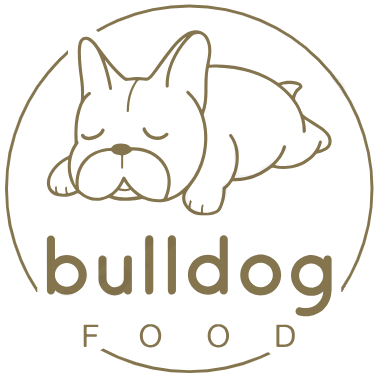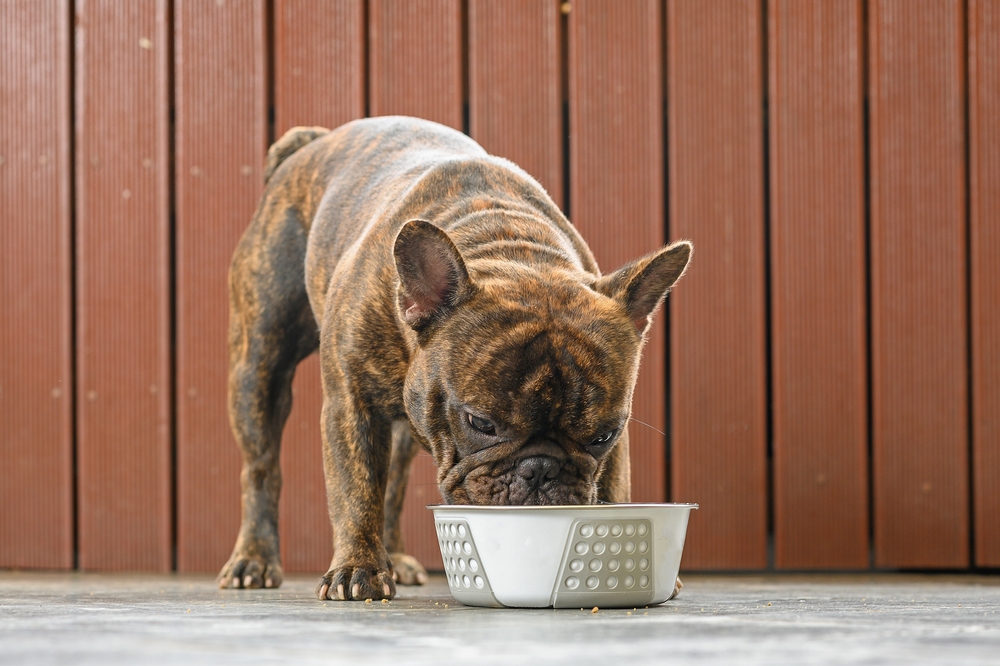As a pet owner, you’ve likely heard the excitement surrounding the French Bulldog raw diet. It’s catching on quickly, much like a Frenchie sprinting after a tennis ball. The concept is straightforward: provide your dog with a diet that resembles what their wild ancestors consumed. This includes raw muscle meat, bones, organs, and even some vegetables!
If you’ve been watching those TikTok clips featuring joyful pups enjoying an array of raw foods and wondering, “Should my Frenchie eat like that?”… you’re in luck! Our detailed guide on raw feeding will address all your queries. Let’s dive in and explore this meaty subject together!
Why Some Frenchie Parents Are Going Raw?
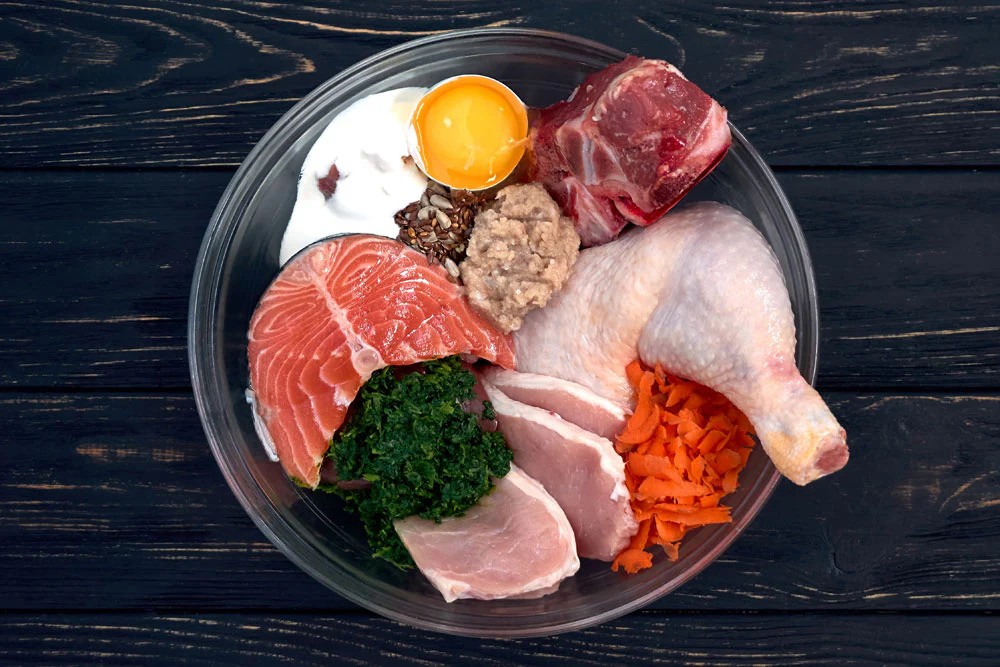
When discussing dog food, most people typically think of kibble or canned wet food. So, why are French Bulldog owners suddenly talking about raw diets?
It’s not just for the amusement of seeing others’ surprised reactions when they mention feeding their beloved dogs raw meat (though that can be quite entertaining). Veterinarians have identified several significant benefits to this type of diet:
- Better digestion: Raw diets are often easier for dogs to digest, which may result in smaller, firmer stools and less gas—something many French Bulldogs struggle with.
- Healthier skin and coat: A well-balanced raw diet rich in high-quality proteins and essential fatty acids can lead to a shinier coat and healthier skin, potentially alleviating allergies and itching.
- Dental health: Chewing on raw meaty bones can naturally clean teeth, possibly decreasing tartar buildup and enhancing overall dental hygiene.
- Weight control: Raw diets generally contain fewer carbohydrates and more protein, which can help maintain a healthy weight—important for French Bulldogs, who are at risk of obesity.
- Increased energy: Some owners notice that their French Bulldogs have more energy and vitality when on a raw diet.
- Fewer allergies: By avoiding processed foods and common allergens, some French Bulldogs may experience a reduction in allergy symptoms.
- Improved muscle tone: The high-quality protein found in raw diets may aid in better muscle development and maintenance.
Sounds appealing, doesn’t it? But hold on—there’s more to think about before making the change!
The Challenges and Risks of Raw Feeding
At this stage, you likely have an appealing image of raw feeding for your Frenchie. However, before diving in, let’s explore the less glamorous aspects of this diet. Here are some potential risks that those TikTok influencers may not have mentioned:
- Nutritional balancing: Crafting a raw diet that fulfills all of your Frenchie’s nutritional requirements requires considerable skill. Unlike the top-quality commercial dog foods, which are developed by teams of veterinary nutritionists over many years to ensure each kibble contains the right nutritional balance, you’ll need to take on that responsibility with a raw diet. Missing a key nutrient could lead to health problems for your Frenchie.
- Bacterial concerns: Raw meat can harbor harmful bacteria such as Salmonella, E. coli, and Listeria. Although your Frenchie’s digestive system is more resilient than ours, it isn’t completely immune to these threats.
- Choking risks and dental issues: While chewing bones can be beneficial for dental health, there’s a twist. Those same bones can also present significant choking dangers, particularly for our flat-faced companions who may be overly enthusiastic chewers.
- Practical challenges: Transitioning to a raw diet is not just a dietary shift; it’s a lifestyle change. Your kitchen may start resembling a butcher shop as you manage bags of organs and various cuts of meat, ensuring proper portion sizes. Plus, consider the extra freezer space you’ll require!
- Financial considerations: Lastly, cost will be a factor. High-quality raw ingredients can be expensive, especially if you’re choosing organic or specialty meats. Additionally, if nutritional deficiencies or foodborne illnesses arise, you might face substantial vet bills.
Your Step-By-Step Guide to French Bulldog Raw Diet
I’m not trying to dampen your enthusiasm for raw feeding. Numerous French Bulldog owners advocate for raw diets and have experienced fantastic outcomes. Nonetheless, as conscientious pet owners, it’s important to approach this with full awareness of both the possible advantages and the risks involved.
Since you’ve considered the pros and cons and chosen to try raw feeding, we suggest taking a gradual approach to determine if this diet suits your Frenchie. Follow our detailed guide:…
Step 1: Get the Green Light from Your Vet
First and foremost, consult your veterinarian. They are familiar with your Frenchie’s medical history and can provide tailored guidance. This is an essential step, especially if your pup has any existing health issues or requires a specific diet for skin allergies.
Step 2: Choose Your Raw Diet Approach
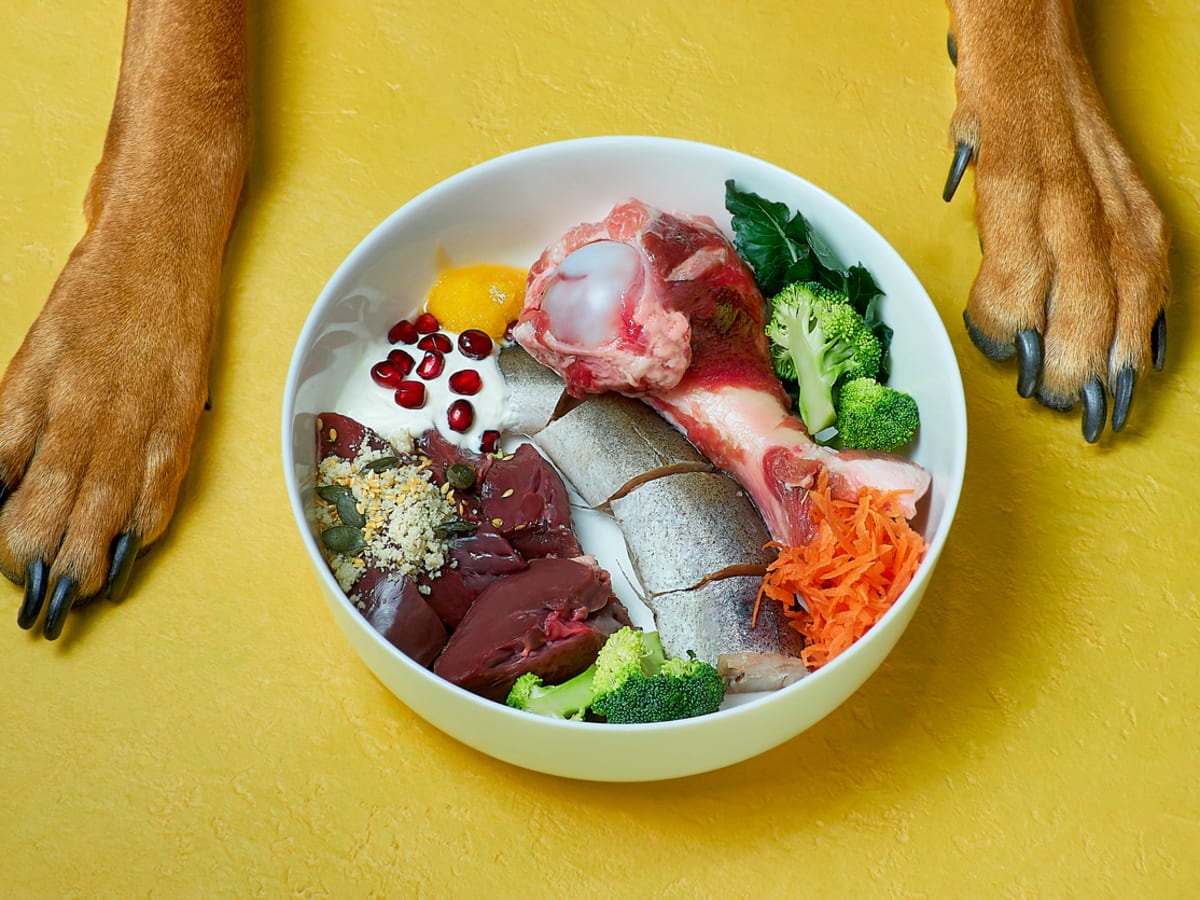
There are several methods to consider when it comes to raw feeding:
- DIY Raw: You purchase and prepare all the ingredients on your own.
- Commercial Raw: Ready-made raw diets available for purchase, either frozen or freeze-dried.
- Combination: A blend of homemade and store-bought raw foods.
For those new to this approach, beginning with a commercial raw diet may be simpler and provide a more balanced nutrition.
Step 3: Calculate How Much to Feed
On average, adult French Bulldogs require approximately 2-3% of their ideal body weight in food each day. For instance, if your Frenchie is supposed to weigh 25 pounds, you would need to provide around 0.5 to 0.75 pounds of food daily. However, keep in mind that each dog is unique, so make adjustments based on your dog’s age, activity level, and metabolism.
Step 4: Plan the Transition
Now, let’s discuss how to gradually introduce your Frenchie to their new diet. A common approach suggested by pet nutritionists and veterinarians is as follows:
- Week 1: Substitute 25% of their existing food with raw.
- Week 2: Raise it to 50% raw.
- Week 3: Increase to 75% raw.
- Week 4: Transition to a completely raw diet.
If your Frenchie experiences any digestive issues during this process, take your time with the transition.
Step 5: Prep Your Kitchen
Feeding pets raw food necessitates additional hygiene precautions:
- Assign particular cutting boards and tools exclusively for raw pet food.
- Ensure all surfaces are cleaned thoroughly after preparation.
- Wash your hands thoroughly both before and after dealing with raw meat.
- Purchase airtight containers for storing prepared meals.
Step 6: Start with a Single Protein Source
Start with a single protein source, such as chicken. This approach helps in recognizing any possible allergies or sensitivities. Once you’ve gone a few weeks without problems, you can begin to add other protein sources.
Step 7: Gradually Introduce Variety
Once your Frenchie is thriving on the initial protein, gradually incorporate additional elements:
- Week 5-6: Introduce a new protein source.
- Week 7-8: Start adding organ meats in small quantities.
- Week 9-10: Include raw meaty bones (ensure supervision).
- Week 11-12: Begin introducing fruits and vegetables.
Step 8: Monitor Your Frenchie Closely
Monitor your puppy closely during this adjustment period. Look out for:
- Variations in energy levels
- Changes in stool consistency
- Condition of skin and coat
- Fluctuations in weight
Maintain a journal to record these observations – it will be beneficial for both you and your veterinarian.
Step 9: Adjust as Needed
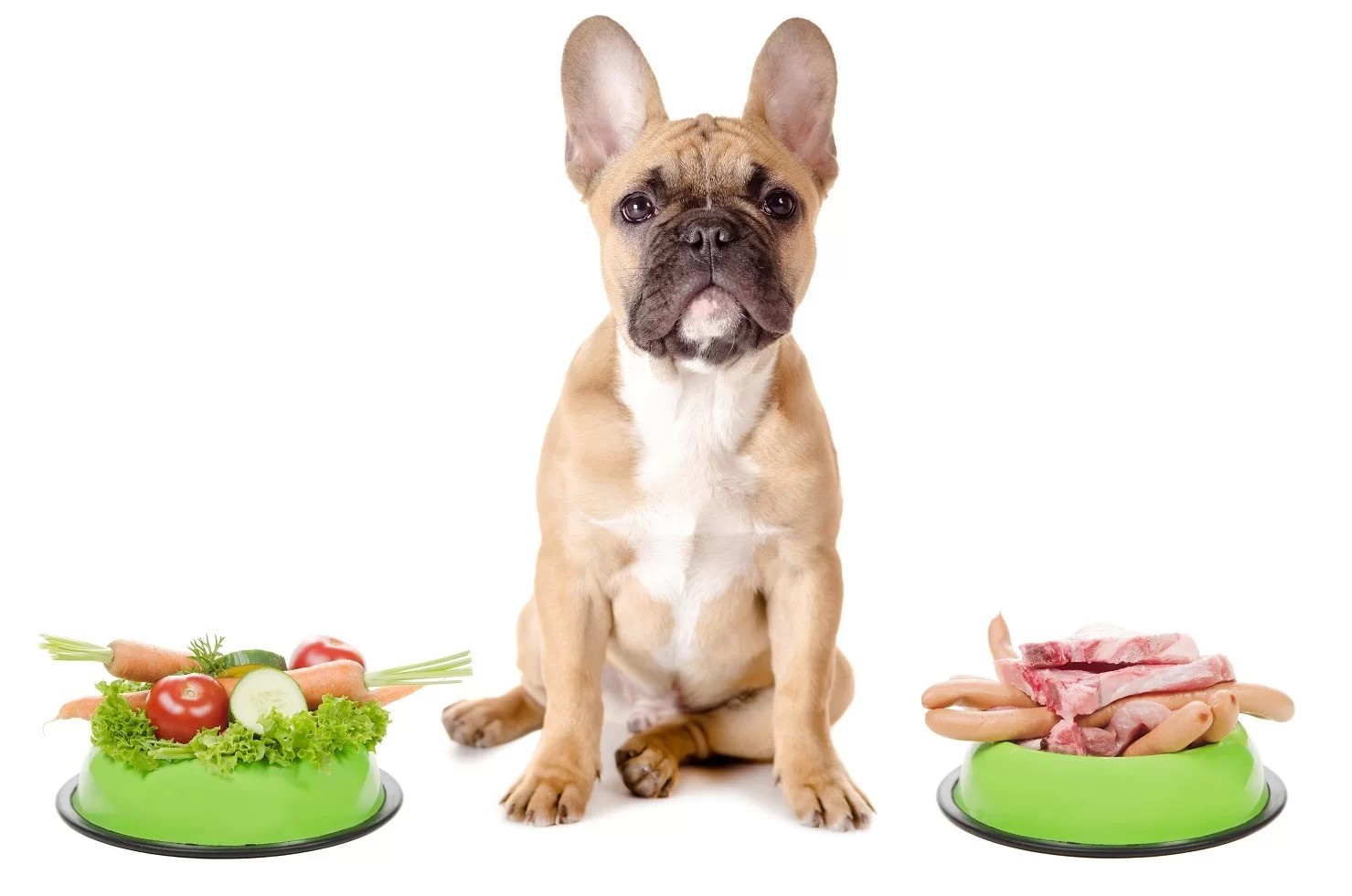
Don’t hesitate to make adjustments. If something isn’t functioning well, modify the amounts, ingredients, or the pace of change. Each Frenchie is one-of-a-kind!
Step 10: Regular Vet Check-ups
Arrange routine visits with your veterinarian, particularly during the initial months of raw feeding. They can assist in confirming that your Frenchie is flourishing on their new diet.
FAQs
Q: Is it Safe to Combine Raw Food and Kibble?
A: Although some pet owners do this, we advise against it. Raw and processed foods have different digestion rates, which can lead to digestive problems.
Q: How Can I Ensure My Pet’s Diet is Complete Nutritionally?
A: Consider collaborating with a veterinary nutritionist to develop a well-rounded meal plan. You might also need to add vitamins and minerals to meet all nutritional requirements.
Q: When Should the Raw Diet be Avoided for Your Pet?
A: While a raw diet can be appropriate for many French Bulldogs, there are specific circumstances where it’s best to avoid it:
- Puppies: Growing French Bulldog puppies have unique nutritional needs that may be challenging to fulfill with a raw diet.
- Senior dogs: Older Frenchies might struggle with digesting raw food and may benefit from diets that are easier to digest.
- Dogs with weakened immune systems: Raw diets can carry a risk of bacterial contamination, which could be harmful to dogs with compromised immunity.
- French Bulldogs with health issues: A raw diet could exacerbate conditions like kidney or liver disease, pancreatitis, and inflammatory bowel disease.
Wrapping Up
Feeding your French Bulldog raw diet can provide various health advantages, but it also carries certain risks. As pet owners, it’s essential to engage in thorough planning and preparation. Our recommendation? Weigh the benefits and drawbacks, take into account your dog’s individual requirements, and always seek advice from a veterinarian before implementing such a major dietary change.
It’s important to note that there isn’t a universal solution for canine nutrition. Whether you opt for a raw diet, high-quality commercial food, or a mix of both, the key is ensuring your French Bulldog receives a balanced and nutritious diet that promotes their health and happiness. If you notice improvements like a shinier coat, stable energy levels, and a healthy weight after transitioning to a raw diet, then it may be a good fit for them.

As an experienced dog foster and canine advocate, I have a special place in my heart for French Bulldogs. Their charming personalities and unique needs sparked my interest, leading me to specialize in Frenchie care. I’ve fostered over 200 Frenchies over the year, gaining deep insights into their dietary requirements and health concerns. This expertise drives my contributions to bestfoodforfrenchbulldog.dog, where I share practical advice on nutrition, care, and enrichment for these lovable flat-faced pups.
My articles aim to educate Frenchie owners on optimal feeding practices and health management. When not writing or fostering, I’m often cuddling with my own Frenchie, Biscuit, my inspiration for helping others care for this delightful breed.
